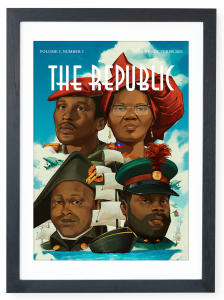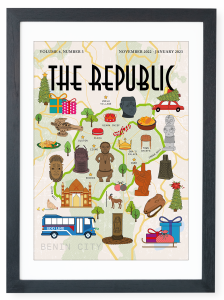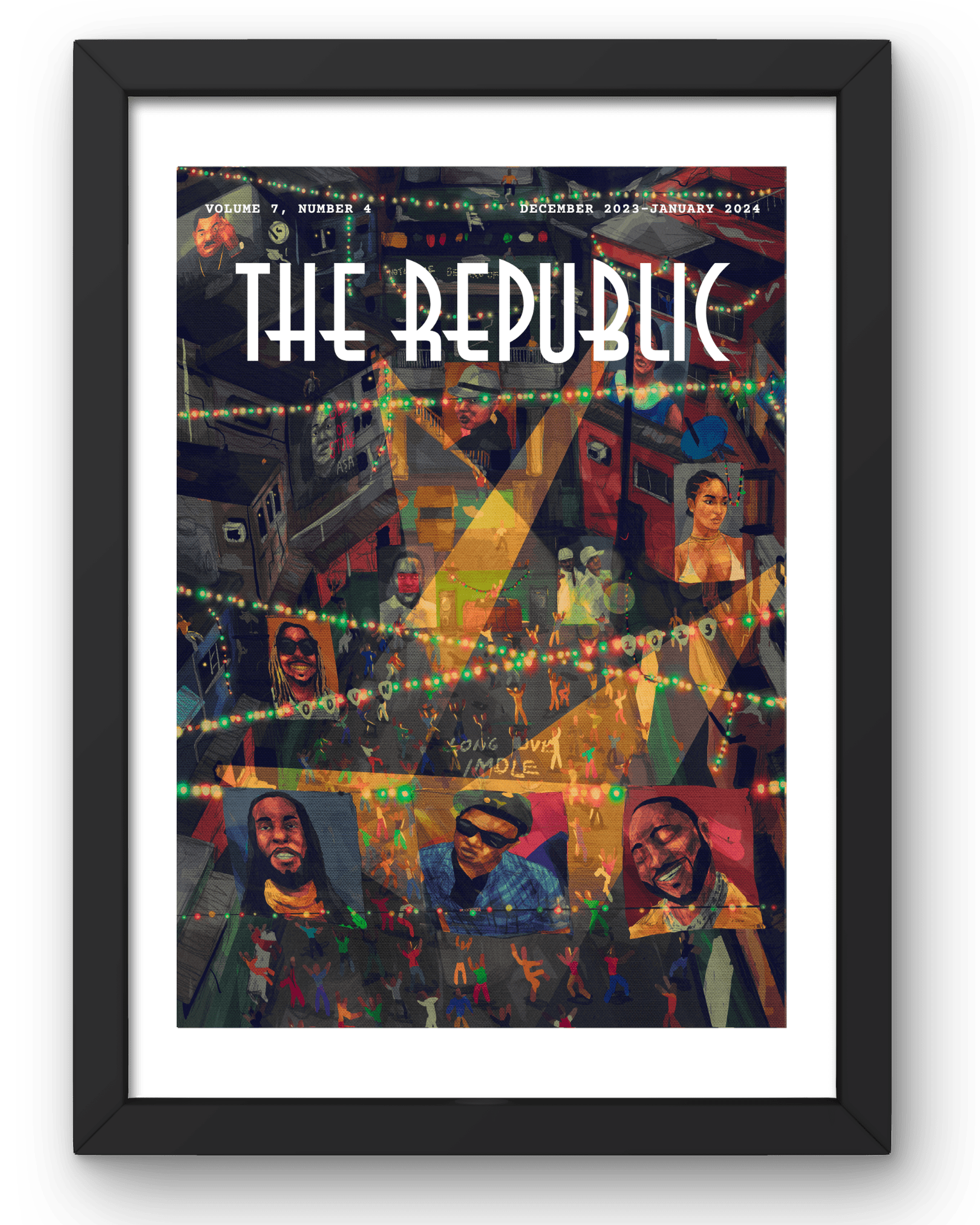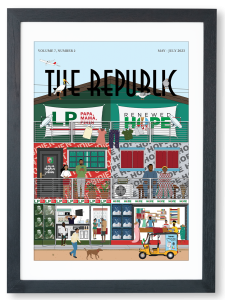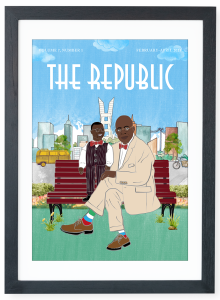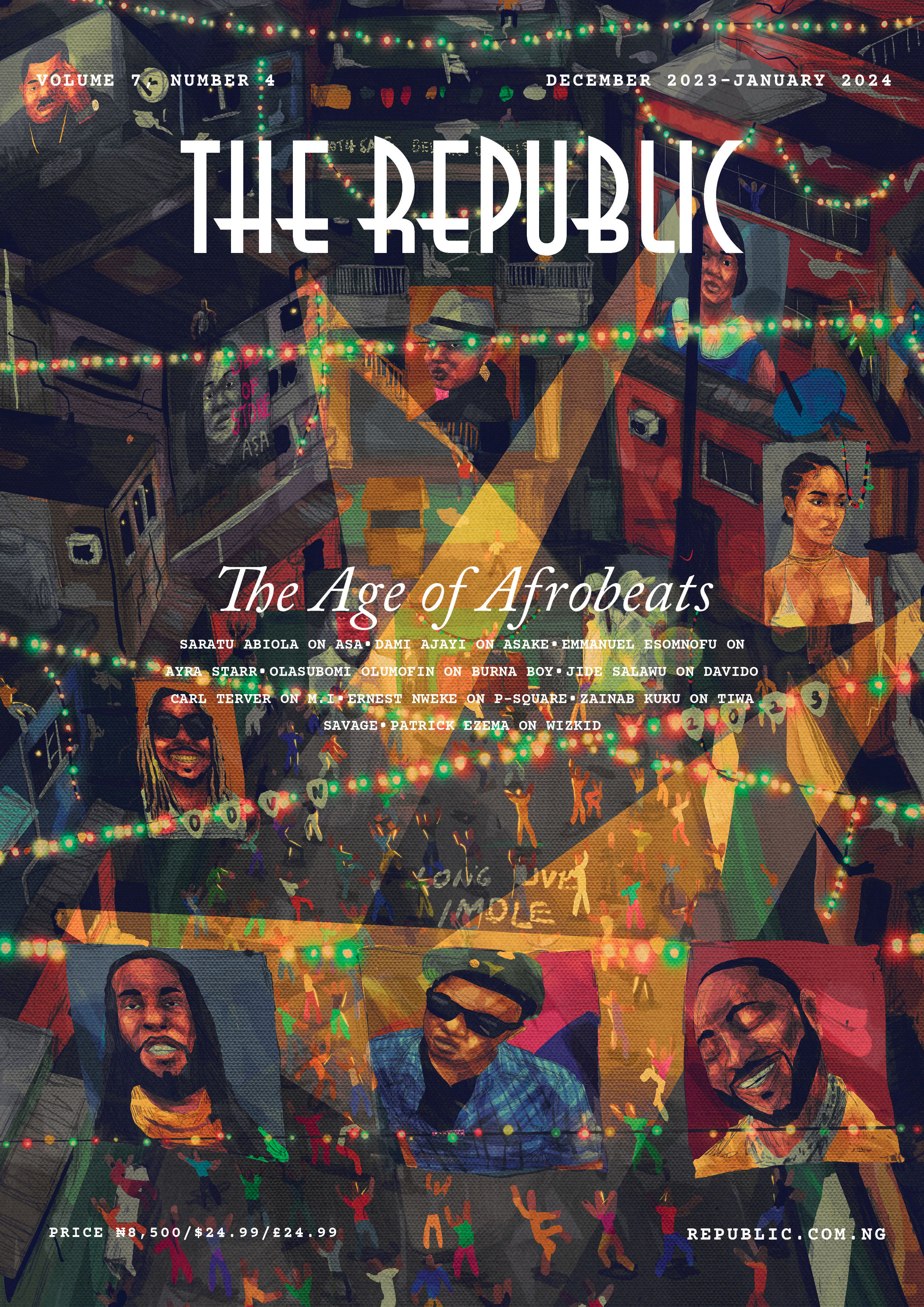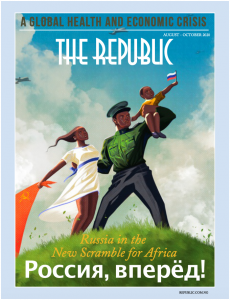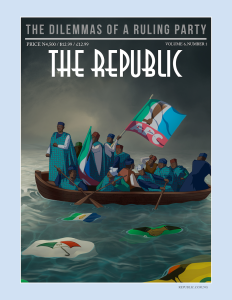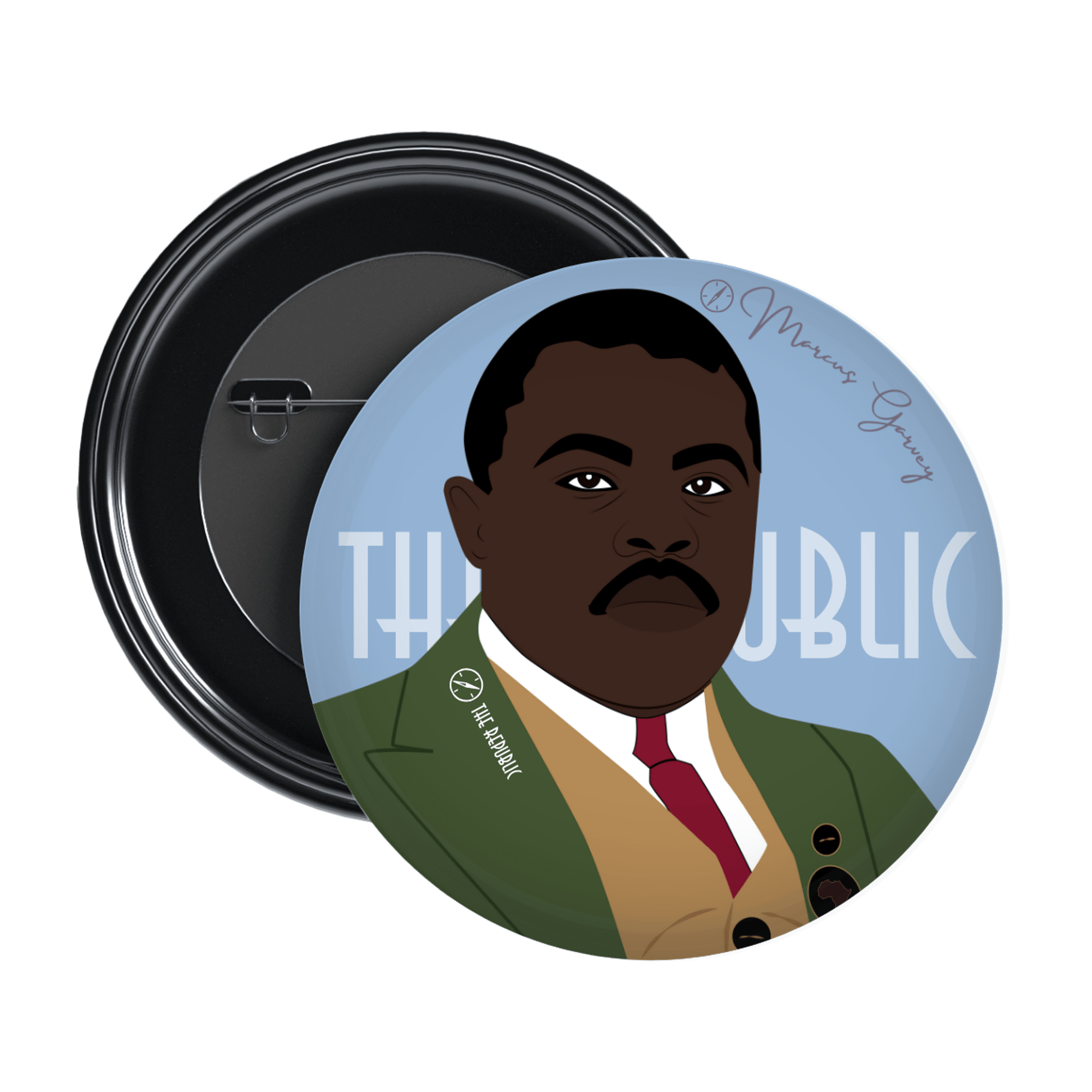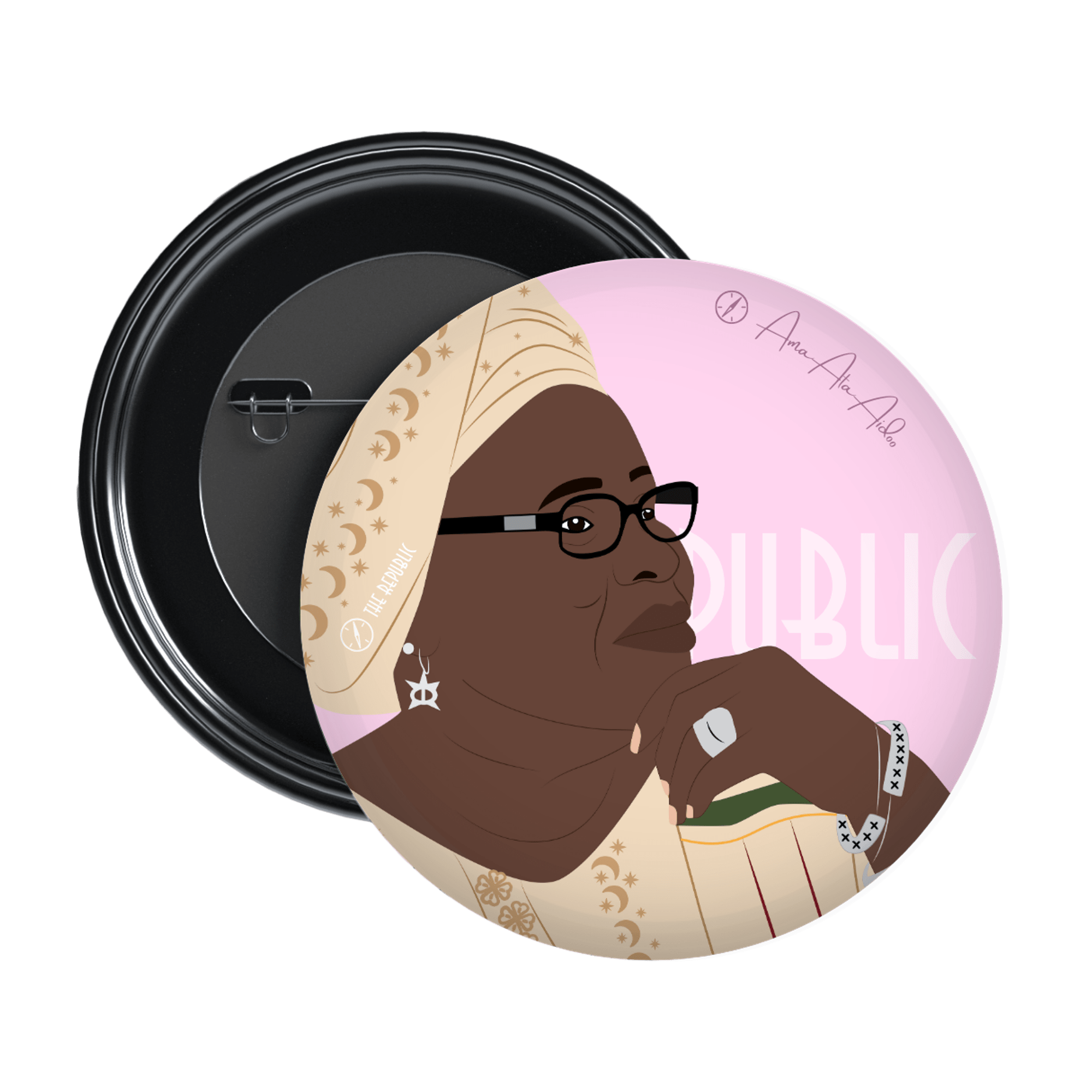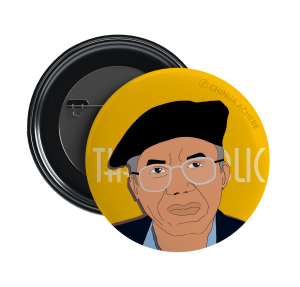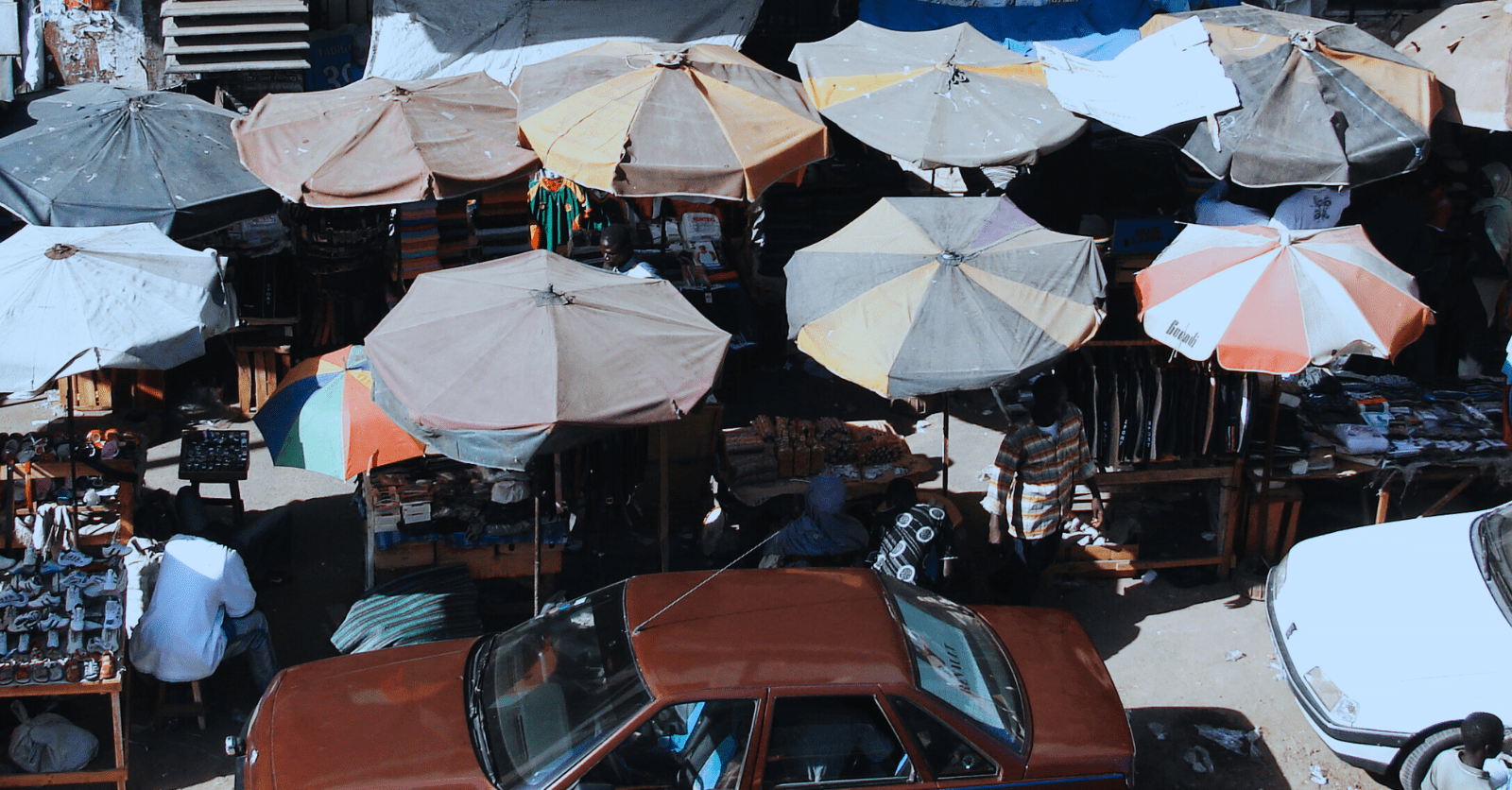
Market Umbrellas, Senegal, 2006. Michelle Schmitt /FLICKR.
the ministry of BUSINESS X THE ECONOMY
ECOWAS Needs to Have a Face

Market Umbrellas, Senegal, 2006. Michelle Schmitt /FLICKR.
the ministry of environment
ECOWAS Needs to Have a Face
In 2000, the launch of the Economic Community of West African States (ECOWAS) passport, which enables the free movement of people across West Africa, became one of ECOWAS’s first achievements towards larger integration amongst member nations. This action was meant to be the first of multiple changes towards creating a borderless West Africa, and harmonizing policies, shipping laws, through a single currency to create a monetary union. After the launch of the passport, the first element toward creating a customs union with a common external tariff was meant to be implemented by 2019, 19 years after the announcement in Bamako.
This simple element underlies the role and effectiveness of ECOWAS. It is an organization with a weak secretariat that is only propped up by state-to-state relations. It is unable to achieve the goals it has set, and this has led to multiple challenges to its goal of creating a borderless West Africa.
Politically, ECOWAS is yet to achieve significant integration. Over the last six months, three countries under military occupation (Niger, Mali and Burkina Faso) have threatened to pull out from the union due to poor management of the situation by its member states. Even before the rise of coups, countries like Benin, have gone out of the union to Rwanda to ask for military support as opposed to members in the region.
Economically, ECOWAS member states—with notable exceptions—have been performing poorly. While there have been concerted efforts by individual economies to become more service-oriented, they are still resource dependent nations and have mostly faced limited growth. West African countries are seeing slower growth with exceptions in Senegal, Ivory Coast, Burkina Faso, Niger and Benin. Countries like Nigeria and Ghana, who account for over two-thirds of ECOWAS’s GDP, have been facing significant currency crises. Both the naira and the cedi have lost over 30 per cent of their value, with Nigeria also battling inflation.

THE LIMITATIONS OF THE EXISTING ECOWAS MODEL
Although West African countries collectively account for 400 million people with significant dynamism, foreign direct investments (FDI) in each country, outside of resource extraction, remains low. Investments are restricted due to a single concern: the markets are small.
West Africa’s cumulative GDP is $761 billion, which, if allotted to a single country, does not make the cut of the largest 20 economies in the world. When you adjust for Nigeria, which accounts for 62 per cent of the region’s GDP, each member state possesses small markets, with about eleven of the 16 countries having a GDP less than $20 billion, while five have a GDP less than $5 billion. These numbers cannot justify large players investing in these markets, given their size. Despite individual markets like Senegal and Côte d’Ivoire seeing sustained economic growth or Nigeria with its large population, investors that must choose between emerging markets would opt for India, Indonesia, China and Ethiopia with larger markets and sustained economic growth.
The current state of ECOWAS does not offer significant solutions to improving the investor outlook of this market. It is quite difficult for a potential investor to see this market as an integrated region like the European Union (EU) or the Association of Southeast Asian Nations (ASEAN). Outside the West Africa Economic and Monetary Union (WAEMU), countries have implemented different tariff systems despite ECOWAS’ common economic tariff zone that was due for implementation by member states in 2019.
Each market has significant regulatory differences in multiple areas. The first is in technical barriers to trade in terms of technical regulations for goods and services and conformity assessment. The second area involves procedures, and sanitary and phytosanitary (SPS) measures that make it difficult to move across West Africa. These Non-Tariff Measures or ‘NTMs’ limit easier access to other markets.
There are significant infrastructural challenges as well. There are no rail or road networks linking West Africa, so the region is left without an efficient mechanism of moving people and goods. In addition, there are no singular local players that offer air routes across West Africa at competitive prices. As a result, the region lacks physical infrastructure that supports free trade of goods and services.
It leads to a challenge where, for instance, investing in Guinea Bissau’s markets does not give you preferential access to expand across West Africa. Non-tariff measures that pose challenges to players outside the market are similar to those experienced by players within the market. Simply put, there are no physical infrastructure benefits of being in the West African market. As a result, countries face the significant challenge of attracting investors to sectors outside traditionally large sectors like extraction and telecommunication. Of the $7.7 billion invested in Africa by private equity players (<2 per cent of total market size) in 2022, West Africa only attracted 18 per cent. In 2023, this figure fell to 11 per cent, of which the majority was captured by Nigeria and Côte D’Ivoire alone.
These challenges are evident in the realities of West African firms. For instance, when Nigerian payment giant, Flutterwave, expanded its African operations in 2023, it opted for the Kenyan market as opposed to other West Africa countries. Similar barriers faced by external investors are faced by local West African firms. Regulations by countries in the region does not encourage intra-regional trade. For instance, goods imported into Nigeria cannot be distributed or sold to other countries. So, a business that distributes solar products in Lagos and wants to expand its offerings to Benin, Niger and Chad, cannot use its stock imported in Lagos within those markets. It must forgo economies of scale, treat each market individually, and receive those stocks individually.
This reality is reflected in intra-regional trade in West Africa, which is one of the lowest of any economic union globally (see exhibit 2).

There is significant value available to business operators within ECOWAS from trading regionally, and potential value for investors with a market of 400 million people and a GDP size of $761 billion. Such value is, however, lost due to the presence of regulations disincentivizing connections, the high number of NTM’s and the absence of any physical infrastructure linking the regions.
WHY ECOWAS NEEDS TO RE-ENGINEER ITS ECONOMIES
Despite all these issues, ECOWAS is at an inflection point, where general macro-economic conditions have aligned to create significant opportunities for West Africa. Regions across the world are seeing slow growth in their population size, with Europe and China, expected to decline. From its current population of 400 million, ECOWAS is expected to grow to over 900 million by 2050. While Africa in general is expected to see the largest growth in population among continents, over 60 per cent of that growth will be in West African countries alone. This creates an opportunity to service the global talent shortage expected in the next 30 years through initiatives such as services outsourcing. A large market of 900 million can also draw in sizeable funding, investments and innovation.
However, if not partnered with economic opportunities, this projected population increase, will quickly turn from strength to liability. Increasing populations will mean increased demand of public services such as healthcare, access to transportation and welfare. If the economies or government do not match this demand, these countries will face a humanitarian crisis. This is a credible concern as eight of the 15 ECOWAS countries currently have a GDP per capita below the poverty rate of $1,036.
From Nigeria to Cape Verde, West African economies are at an inflection point, both politically and economically. The region is behind emerging markets and even other African regions like the East African Community. However, given the general decline in global population growth and the increasing aging populations of the Global North, West Africa has the opportunity to leverage its youth to drive innovation, growth and gain specialization. This creates the opportunity that leaders saw in Bamako in 2000 to create a borderless West Africa that can become a regional power and improve member states economic outcome.
shop the republic
A ‘REAL’ ECONOMIC UNION
Creating a real economic union will involve creating a common market with similar tariff rules, eliminating non-tariff measures, and driving economic integration. It would also involve providing the physical infrastructure to support the free trade of goods and services. A great example of a functioning economic union, irrespective of its challenges is the ASEAN, which has eleven member states, a combined population of 662 million, and a GDP of $3.2 trillion.
Creating a common economic market means creating free trade agreements with large countries or large economic unions. The largest free trade agreement globally, was made by the ASEAN with China, Japan, South Korea, Australia and New Zealand, giving members access to a population of 2.3 billion people and a GDP size of $38.8 trillion.
With a strong ECOWAS union, it will be easier to negotiate free trade agreements with regional superpowers or other economic unions. The presence of a potentially integrated market, as seen in both Europe and Asia would create an avenue for increased investments and access to more favourable deals. These opportunities would not be available to a single ECOWAS economy given their limited size.
The state of FDIs across ECOWAS will also see significant increase if investors see the possibility of accessing the regional market through a singular country. This makes it easier to justify investments into smaller economies or to see possibilities for expansion. Countries like Switzerland and Liechtenstein in Europe have seen increased investments from FinTech firms because of the launchpad these firms see in accessing the European markets. At the very least, a more active economic union would see the case for investments into the region to support West Africa’s sizable energy, and its rail and road needs.
Internally, there are benefits ECOWAS would receive from a stronger economic union. Intra-regional FDIs are often overlooked for developing economies but are often a sizable contribution across economies. It also opens markets to existing entrepreneurs, where strong retail firms in Côte D’Ivoire would be able to operate in local markets in West African cities like Niamey, Lagos and Dakar.
Additionally, there is the larger possibility of seeing increased regional trade across markets as a catalyst for economic growth. Considerable value in agricultural processing is lost to economies in Ghana, Côte D’Ivoire and Nigeria. Potential value in extraction of gold and oil is lost to economies in Niger, Burkina Faso, Guinea, Mali and Nigeria. Economic integration, however, will provide opportunity for specialization as it becomes easy for large operators to source materials in the region, process them in a singular country, and export the proceeds. A good example where this has happened has been Slovakia’s automotive industry benefitting from the EU’s regional value chain, despite being one of the smaller economies in Europe.
shop the republic
THE CASE FOR A MONETARY UNION?
Although a monetary union within ECOWAS would further accelerate the benefits of economic integration, it comes with many risks. Expanding from an economic union like the ASEAN to a monetary union like the EU has even much larger potential benefits. Any benefit from a similar economic union would be exaggerated, as both investors and local players have a reduced barrier from different currency. However, the largest benefit is dealing with the currency challenge that the entire West Africa face. Non-CFA countries would achieve currency stability which they lack and countries with a central franc will gain access to an independent central bank outside of the Bank of France’s influence. This provides the capability to deliver much needed stimulus when shocks happen in the region.
Countries outside a monetary union in West Africa like Nigeria, Ghana, and Sierra Leone have been facing significant depreciation of their local currency of over -30 to 50 per cent to the dollar in the last 12 months. As a result, these countries are experiencing significant inflation and disruptions to their economies. A unified currency would reduce the challenges faced by depreciations and limit the imported inflation to the economic union.
CFA countries like Côte D’Ivoire, Senegal, Mali and Guinea are not spared despite having more stable currencies. Their monetary policies are effectively in the hands of the European Central Bank. When shocks happen, they do not have the capability to raise the stimulus needed to support the economies. The fixed parity with a currency as powerful as the European franc harms the competitiveness of exporting companies and handicaps domestic producers. Domiciling that control within West Africa would enable these countries have monetary policy that reflect their economic reality while providing stability. These benefits are well-known to the ECOWAS union, and since 2003, the union has postponed the launch of the currency four times; in 2005, 2014, 2014 and 2020. The new planned date for the currency launch is now 2027.
The simple truth is that West African countries have different economic structures. Some like Mali, Burkina Faso, Guinea rely on exports of commodities; and others like Côte D’Ivoire and Ghana are transitioning away from this model. The difference in GDP per capita between one of the richest West African countries, Cape Verde, and one of the poorest West African countries, Sierra Leone, is over seven folds. Exposure to debt, GDP, and the size of fiscal deficits are also significantly different across the region. This points to the fact that the monetary policy needs of each country are significantly different, and while ECOWAS has created a list of preconditions for member countries to reduce variance, not a single country has met the full list of preconditions as of 2023.
There is also the difficulty when it comes to Nigeria. Nigeria accounts for 62 per cent of the entire region’s GDP, and its economy has been unstable over the last five years, meaning that were Nigeria in a singular monetary union, the shocks it faces would likely reverberate across the entire union affecting its growth and stability. Unlike the situation where a strong Germany served to drive and support the Euro in the nascent years, it does not seem likely that West Africa’s biggest economy is in any shape to do this.
The potential gains from a monetary union are great, but in a region where monetary policy needs vary significantly across countries, which have vastly different economies, it could quickly become a crutch. In a situation where different economies are exposed to different shocks, supporting or failing to do so, would hamper differing economies and could lead to transfer flows across the region (as opposed to growing the region) and create an unstable currency.
shop the republic
ACHIEVING A MORE INTEGRATED ECONOMIC UNION
ECOWAS member states require stronger economic integration by strengthening both secretariat and promoting itself in other member states. There is consensus across the region of the need for West African countries to work together to harness the region’s growth potential. Despite the continued decline in the relevance of ECOWAS, evidenced by its failures both politically in handling coups in Burkina Faso, Niger, and Mali, and economically in achieving its objectives, there remains a consensus among the leadership of each member country that working together as a group is important to improve the economic realities of their nations. To achieve an effective economic union, there are four key things that are required.
Sub-regional organizations within ECOWAS are rampant. There is the L’Union Économique et Monétaire Ouest Africaine (UEMOA), the Accra initiative, a planned Sahel initiative, and the Anglophone ECOWAS. The secretariat is not seen as technically competent to deal with the challenges of the region as it is not being championed by West African leaders. Hence, these four essentials. Firstly, it is important that ECOWAS is championed and promoted by West Africa’s leaders, and given the nature of West Africa, that ECOWAS hold flexibility for political instability. Countries like Nigeria, Ghana and Côte d’Ivoire are the regional giants and need to do more by driving member countries to seek solutions via the ECOWAS framework. This, however, requires that ECOWAS be technically competent and regionally capable.
Secondly, it is important to invest in creating strong institutions that are not directly impacted by mercantile presidents. To achieve its overall goals, ECOWAS cannot continue to be led by country presidents, as there is a clear problem of resource management and commitments. The EU has a strong president, the ASEAN union has a strong secretary-general, ECOWAS, on the other hand, has both a president from head of states and a head of commission who ends up deferring to the head of states, ensuring that it is led by a pre-occupied president.
It is important to end this delineation and create a team of strong technical leads voted in by member states; focus country leads should handle ratifying decisions and deciding the focus of the commission. Creating this would involve a stronger ECOWAS secretariat domiciled across each member state, integrated in each sector and focused on achieving a clear purpose for the region. ECOWAS cannot remain driven by state-to-state relations if it is to become more than it currently is.
Thirdly, ECOWAS needs to have a face. No one within West Africa can point to how ECOWAS affects their life, what opportunities it has created or its impacts. It only has face value in Sierra Leone and Liberia from its actions 20 years ago in ending civil wars. Creating a clear story on the impact that ECOWAS has to the 400 million people living within the bloc is needed if ECOWAS is to become a significant institution.
Lastly, ECOWAS needs to integrate the above with developing the physical infrastructure needed to support an economic union. Investment into road, rail and air infrastructure that connect the markets will spur further investment from both foreign and intra-regional players to treat the region of 400 million people as a large market—rather than a collection of small markets—with strong growth potential⎈




